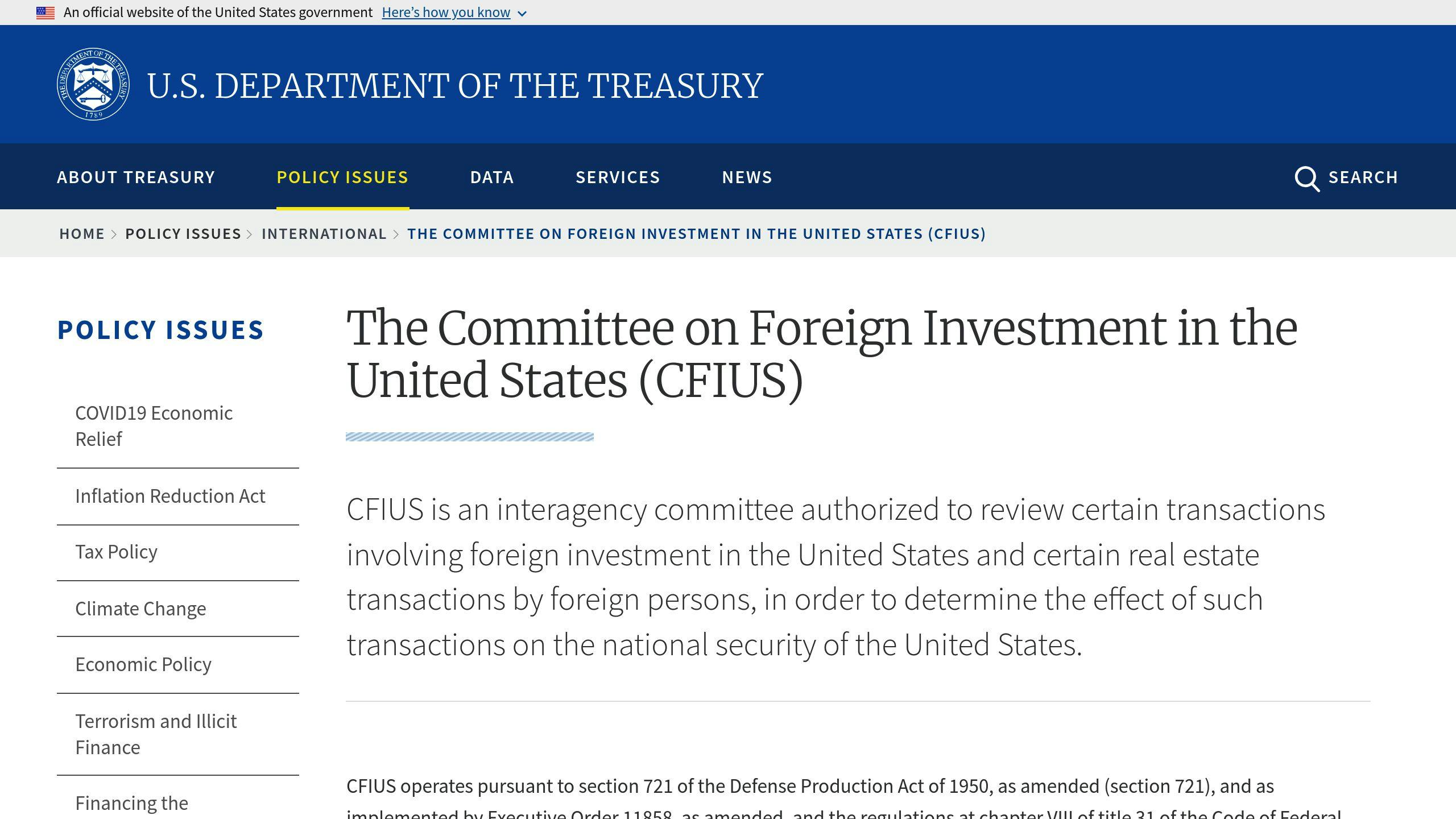Cross-border venture capital investments are complex and come with strict compliance requirements. Here's what you need to know:
- Regulatory Differences: Countries have varying financial standards (e.g., U.S. GAAP vs. IFRS) and laws like GDPR or FIRRMA that investors and startups must navigate.
- Entity Setup Costs: Establishing a foreign entity can cost $20,000+ and take months, requiring careful planning.
- Tax Challenges: UBTI taxes and FIRRMA reviews increase complexity for U.S. investors and startups.
- Reporting Obligations: Detailed records, regulatory filings, and compliance with CFIUS are essential for cross-border deals.
- Compliance Tools: Using governance frameworks and automated tools helps manage risks and streamline compliance.
To succeed, startups must stay ahead of regulatory changes, maintain accurate records, and work with experienced advisors. Balancing compliance efforts with investor needs is key to securing funding and scaling globally.
Navigating Regulations and Compliance in Venture Capital
Major Compliance Challenges in Cross-Border VC Investments
Cross-border venture capital investments come with a range of compliance hurdles that can complicate international funding deals. Being aware of these challenges is essential for smooth global operations.
Differences in Regulations Across Countries
Dealing with varying regulatory frameworks is one of the toughest parts of cross-border VC investments. For example, financial reporting standards differ widely - while many countries use IFRS, the U.S. has its own standards, creating extra layers of complexity [1].
Failing to comply with regional regulations like GDPR can lead to hefty fines, as demonstrated by recent high-profile cases [1]. Startups often grapple with issues like financial reporting, data privacy, and investment controls, any of which can slow down deals or result in penalties.
Setting Up Entities and Meeting Local Compliance
In addition to understanding regulatory differences, startups must tackle the operational challenges of establishing a legal foothold in foreign markets. Setting up a local entity can take months and cost upwards of $20,000 [1]. This requires careful planning as part of any expansion strategy.
Local compliance requirements can vary widely and may include:
- Establishing legal entities in target markets
- Navigating complex local tax laws
- Meeting minimum capital requirements to operate
- Staying aligned with local regulatory bodies
Thorough due diligence and accurate compliance records are essential to managing these obstacles [1]. Addressing these issues not only ensures compliance but also strengthens relationships with international investors, keeping funding opportunities on track.
Tax Laws and Their Impact on Cross-Border Investments
Tax rules play a major role in shaping cross-border venture capital investments, adding layers of complexity that both investors and startups must address.
Unrelated Business Taxable Income (UBTI)
U.S. tax-exempt investors often face hurdles when involved in cross-border venture deals due to UBTI. This tax applies to income from activities that don’t align with the investor's tax-exempt purpose. Examples include dividends, interest payments, and licensing royalties from foreign entities.
To reduce UBTI exposure, some investors use structures like "blocker" corporations. These entities act as a buffer, shielding investors from direct UBTI liabilities. However, this strategy comes with added costs and complications [2].
Foreign Investment Risk Review Modernization Act (FIRRMA)

FIRRMA has reshaped how foreign investments in U.S. startups are reviewed, especially in sectors deemed sensitive. The act expanded CFIUS’s authority to examine even non-controlling investments, introducing stricter compliance requirements for both investors and startups [3].
FIRRMA requires CFIUS reviews for investments in areas like critical technology, infrastructure, and personal data. These reviews typically take 45 to 90 days. Recent regulations under the Biden Administration have increased scrutiny, particularly for investments from Chinese entities or those involving restricted technologies that demand special notifications [4].
Given these challenges, startups and investors need to stay ahead by conducting thorough due diligence, keeping detailed records, and working with tax advisors familiar with international laws. Proper planning and compliance are key to managing risks and ensuring smooth cross-border transactions.
sbb-itb-8981daa
Reporting Requirements and Compliance Measures
Cross-border venture capital investments come with strict reporting and compliance obligations. Navigating these rules is essential to operate within the complex regulatory framework, especially given the growing focus on national security and technology transfers.
CFIUS Reporting Obligations
Under FIRRMA, CFIUS reviews target areas like critical technologies, infrastructure, and personal data. To meet these requirements, startup founders must provide:
- Details about foreign investors and their transaction rights
- Technology classifications and intended uses
- Complete records of transactions and due diligence
All records must be kept for at least ten years and must be accessible for Treasury Department audits.
Outbound Investment Control Regulations
While CFIUS focuses on inbound investments, outbound investment controls place strict demands on U.S. investors. These controls, particularly for investments tied to PRC-related companies or critical technologies, are enforced by the Department of the Treasury.
Key compliance steps include:
| Requirement | Timeline |
|---|---|
| Pre-investment reviews of restricted technologies | Before investment |
| Retention of transaction and compliance records | 10 years |
To stay compliant, startup founders dealing with cross-border VC investments should prioritize:
- Conducting regular national security assessments
- Maintaining detailed transaction documentation
- Keeping up with regulatory updates
- Consulting with specialized compliance attorneys
"Policymakers will continue to see capital deployed overseas if foreign direct investment becomes too limited." - Jonas Murphy, Director of Government Affairs, National Venture Capital Association [3]
The National Venture Capital Association highlights the need to balance national security concerns with fostering foreign investment in U.S. startups [3]. Striking this balance is essential for maintaining healthy cross-border investment flows while adhering to legal requirements.
The next section will delve into practical strategies for managing these compliance challenges.
Strategies for Managing Cross-Border VC Compliance
Managing cross-border venture capital compliance involves a careful balance of governance and technology. With international regulations varying widely, a structured approach is necessary to navigate these complexities effectively.
Building a Global Governance Framework
A well-designed governance framework helps manage compliance across different regions while keeping operations efficient. This framework should address the specific regulatory requirements of each jurisdiction.
Here’s a breakdown of key components:
| Component | Purpose | Implementation Timeline |
|---|---|---|
| Compliance Policies | Set clear compliance standards | 4-6 weeks |
| Risk Management Systems | Monitor and evaluate risks | 8-12 weeks |
| Reporting Structures | Ensure accurate documentation | 6-8 weeks |
| Audit Programs | Regularly verify compliance | Quarterly |
Once this framework is established, integrating technology can make compliance efforts more efficient and reduce risks.
Leveraging Compliance Tools and Technology
Technology plays a critical role in managing cross-border compliance. Advanced tools offer monitoring and automation capabilities, simplifying the process and reducing potential risks.
Key features to look for in compliance tools:
- Automated compliance reporting
- Tools for tracking regulatory changes
- Risk assessment capabilities
- Efficient document management
- Cross-border compliance tracking systems
While technology simplifies compliance, working with the right investment partners is just as important.
VC Investor List: Connecting with the Right Partners

VC Investor List is a platform that helps founders find investors with expertise in cross-border compliance. This ensures better regulatory alignment and smoother operations. Founders can use the platform to:
- Identify investors knowledgeable about cross-border regulations
- Match with firms familiar with specific compliance frameworks
- Access investors suited for different funding stages
- Verify partners' compliance histories
"Policymakers will continue to see capital deployed overseas if foreign direct investment becomes too limited." - Jonas Murphy, Director of Government Affairs, NVCA [3]
The National Venture Capital Association highlights the importance of balancing passive foreign investment with CFIUS compliance [3]. This equilibrium is essential for encouraging cross-border investments while adhering to necessary regulations.
Mastering Cross-Border VC Compliance
Navigating the complexities of cross-border venture capital compliance demands a mix of legal know-how, smart tools, and strong partnerships. To minimize risks and make the most of investments, it's crucial to tackle legal requirements, tax arrangements, and reporting obligations head-on.
Founders need to stay alert to changing regulations. This means keeping detailed records, maintaining open communication with regulators, and regularly updating policies. Tools like governance frameworks and compliance platforms - such as VC Investor List - can play a key role in helping founders meet regulatory requirements while securing international investments.
Platforms like VC Investor List offer access to investors experienced in handling cross-border challenges. Their knowledge is a game-changer when navigating the legal and financial intricacies of multiple jurisdictions.
The key to future success in cross-border VC investments lies in balancing compliance with flexibility. By using solid frameworks, advanced tools, and building the right connections, founders can confidently handle the challenges of cross-border compliance and reduce potential legal or financial pitfalls.


